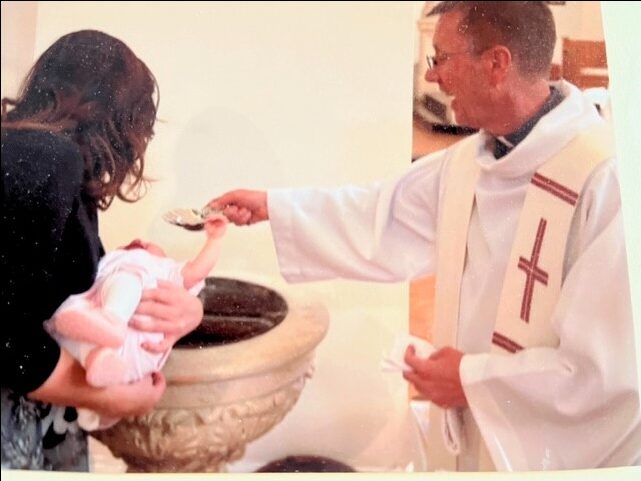
To join a baptism course, please contact the Parish Office to arrange an initial meeting with the Parish Priest via [email protected].
Children are normally baptised in their own Parish. Parents who wish to have their baby baptised in another Parish should discuss this with their own Parish Priest as well as the Priest in the Parish where the baptism is to take place.
The preparation is required by the Rite of Infant Baptism 1969.
Here are some useful questions and answers:
How soon should I have my child baptised?
Children should be baptised within the first weeks after birth. You are very welcome to come and arrange a date for the Baptism before the child is born. The priest will then also be able to give the blessing for an expectant mother and pray for the safe delivery of the child.
How do I arrange a Baptism for older Child?
If children are over the age of five they will require some instruction before they can be baptised. Please contact the Parish Priest for details. Arrangements for Baptism can be made when the instruction is nearing completion
I am not married. Can my child be baptised?
Yes. A child may be baptised so long as there is a well-founded hope that they will be brought up in the practice of the Catholic faith. If you have any questions about marriage in the Catholic Church, please ask the priest because there are often misunderstandings in this area.
I do not live in the parish. Can I have my child baptised at St. Simons?
Yes, if you regularly come to Mass here. If you are not coming to Mass, you need to decide which will be the Church you are going to start attending. It will usually be more appropriate (and more convenient) for you to start going to Mass at your local parish and to arrange the Baptism there.
How many Godparents should we have?
The Church’s Canon Law states that there should be one or two Godparents. If there are two, they should be a Godfather and a Godmother.
Who can be Godparents?
Godparents should be Catholics over 16 years of age who themselves regularly come to Mass and have been confirmed.
What about non-Catholics?
Alongside the Catholic Godparent(s), a non-Catholic who is a baptised Christian may stand as a Christian witness, similar to a Godparent.
Neither I nor my spouse is Catholic. Can our child(ren) be baptised Catholics?
Only if one of the parents decides to become a Catholic themselves. This is a process which involves prayer, instruction and sharing in the life of the Catholic community over several months at least. The most appropriate conclusion to this process is for the family to be baptised together. Please ask the priest for further details.
Are there places in the Catholic school?
Catholic schools are often over-subscribed. Baptism alone will not be any guarantee of a place. First priority is always given to those who come regularly to Mass.
I had a child baptised but I never got a Baptism certificate. How can I get one?
Every parish keeps a Baptism register in its permanent archive. A certificate can always be provided for you by the parish where your child was Baptised. The easiest way to get one is to send a note to the Parish Priest. Give the child’s full name, date of birth and date of baptism and enclose a stamped addressed envelope.
Can adults be baptised?
Yes. An adult will be baptised as part of the Rite of Christian Initiation of Adults (please see the section under “Groups”).
What the Church teaches:
The following are taken from the catechism of the Catholic Church (the numbers refer to the paragraphs in the document, should you wish to look them up and read further – there is a link to the Catechism in the “Links” page):
1213 Holy Baptism is the basis of the whole Christian life, the gateway to life in the Spirit (vitae spiritualis ianua), and the door which gives access to the other sacraments. Through Baptism we are freed from sin and reborn as sons of God; we become members of Christ, are incorporated into the Church and made sharers in her mission: “Baptism is the sacrament of regeneration through water in the word.”
1214 This sacrament is called Baptism, after the central rite by which it is carried out: to baptise (Greek baptizein) means to “plunge” or “immerse”; the “plunge” into the water symbolises the catechumen’s burial into Christ’s death, from which he rises up by resurrection with him, as “a new creature.”
1215 This sacrament is also called “the washing of regeneration and renewal by the Holy Spirit,” for it signifies and actually brings about the birth of water and the Spirit without which no one “can enter the kingdom of God.”
1216 “This bath is called enlightenment, because those who receive this [catechetical] instruction are enlightened in their understanding . . . .” Having received in Baptism the Word, “the true light that enlightens every man,” the person baptized has been “enlightened,” he becomes a “son of light,” indeed, he becomes “light” himself:
Baptism is God’s most beautiful and magnificent gift. . . We call it gift, grace, anointing, enlightenment, garment of immortality, bath of rebirth, seal, and most precious gift. It is called gift because it is conferred on those who bring nothing of their own; grace since it is given even to the guilty; Baptism because sin is buried in the water; anointing for it is priestly and royal as are those who are anointed; enlightenment because it radiates light; clothing since it veils our shame; bath because it washes; and seal as it is our guard and the sign of God’s Lordship.